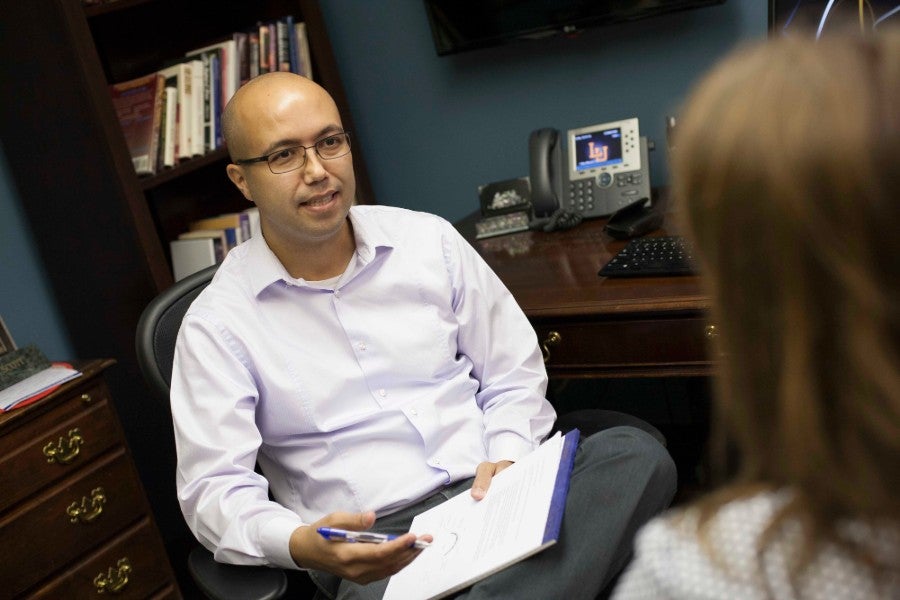Lipscomb's largest grant receives supplement to address treatment of opioid epidemic
The largest grant awarded to Lipscomb University, $1.8 million awarded in 2017, received an additional $400,000 supplement in 2018 allowing the Clinical Mental Health Counseling Program to expand its innovative Behavioral Health Initiative to more directly impact victims of the opioid epidemic.
Anna Moseley |

Dr. Douglas Ribeiro, associate professor of psychology, counseling and family science.
The largest grant awarded to Lipscomb University, $1.8 million awarded in 2017, received an additional $400,000 supplement in 2018 allowing the Clinical Mental Health Counseling Program to expand its innovative Behavioral Health Initiative to more directly impact victims of the opioid epidemic.
The original grant, awarded by the Health Resources and Services Administration, an agency of the U.S. Department of Health and Human Services, funds a project proposed by Douglas Ribeiro, associate professor of psychology, counseling and family science, to develop health care professionals to work on-site in medical offices. The program has placed 38 mental health counseling interns in 14 clinics so far.
Such an approach addresses unmet mental health needs of medically underserved populations, particularly immigrant populations and residents whose primary language is not English, said Ribeiro.
The supplemental grant has allowed Lipscomb to partner with two clinics, Nashville’s Matthew Walker Comprehensive Health Center and Neighborhood Health, located in the James A. Cayce Homes, both of which are using their own $400,000 portions of the total grant to combine behavioral health treatment with medication-assisted treatments specifically for opioid and substance use disorders.
“The majority of work at these clinics is serving the folks who receive the least amount of resources in our community. This was an opportunity to partner with the agencies who are doing the most critical work,” said Ribeiro.
“Davidson County has one of the highest overdose rates in the country,” he said. “It is above the national average.”
According to the National Institute on Drug Abuse 1,186 people died from an opioid-related overdose in Tennessee in 2016. This expansion of Lipscomb’s Behavioral Health Initiative is working to combat these statistics by integrating on-site mental health care into substance use treatment.
“When someone has a need, particularly in the underserved populations, they often go to their primary care physician first,” said Ribeiro. “By integrating counselors into the traditional primary care physician offices, the counselor and the physician can collaborate on-site about how to best serve the patient and to provide the needed care right away.”
Lipscomb student counseling interns were placed in the two clinics in January to expand their existing mental health staff and services
In working with patients, Lipscomb’s counseling interns will practice skills crucial for treating substance abuse patients such as motivational interviewing, assessing the patient’s readiness for change and considering the impact substance abuse is having on other aspects of their lives and health issues.
“Counselors are trained to treat substance abuse, but in a health clinic setting, our students will be learning how to provide treatment beyond an abstinence only type of model. In this situation, medication-assisted treatments come into play,” Ribeiro said.
Before Lipscomb students begin work in the clinics, they must complete training with the medical staff at their intern site. Students will also complete a substance abuse course and will learn how to provide medication-assisted treatments for opioid use.
Other aspects of the Behavioral Health Initiative include placing interns in clinics with large immigrant and underserved patient populations, training community organizations in integrating behavioral health models into their care plans and providing interprofessional training for mental health counseling students with other health professions on Lipscomb’s campus.
To learn more information, visit the Department of Psychology, Counseling and Family Science website.